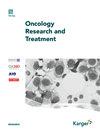表皮生长因子受体(EGFR)加 MET 靶向疗法用于克服表皮生长因子受体突变 NSCLC 的耐药性。病例报告。
IF 1.6
4区 医学
Q3 ONCOLOGY
引用次数: 0
摘要
导言致癌基因突变的非小细胞肺癌(NSCLC)已成为最常见的肺癌形式,其治疗方法也呈现出一种动态的发展态势。其中,表皮生长因子受体(EGFR)突变型 NSCLC 仍是最主要的致癌突变,在亚洲和拉丁美洲等地区尤为流行。本病例研究重点介绍了一名女性患者的经历,她被诊断为 EGFR 敏感型(19 号外显子δ突变)NSCLC,对第三代 EGFR-TKI 治疗的反应持续时间(DOR)延长。疾病进展时,由于检测到 MET 基因扩增,因此在现有的表皮生长因子受体-TKI 治疗方案中增加了选择性 MET 抑制剂,结果患者获得了完全应答。讨论/总结近年来,这种疾病的分子异质性明显增加,其复杂性显著提高,其标志是基线共变的确定以及表皮生长因子受体酪氨酸激酶抑制剂 (TKI) 治疗后广泛耐药机制的发展。这种复杂性给临床医生带来了巨大挑战。尽管靶向疗法发展迅速,而且通过联合策略实现了治疗升级,但对于哪些患者在初始治疗阶段和疾病进展时最能从联合疗法中获益,仍存在争议,尤其是在发现了非靶向耐药机制或共变异的情况下。本文章由计算机程序翻译,如有差异,请以英文原文为准。
EGFR plus MET targeted therapies for overcoming treatment resistance in EGFR mutant NSCLC. A Case Report.
INTRODUCTION
Oncogenic-addicted non-small cell lung cancer (NSCLC) has emerged as the most prevalent form of lung cancer, presenting a dynamic landscape in treatment modalities. Among these, epidermal growth factor receptor (EGFR)-mutant NSCLC remains the predominant oncogenic mutation, particularly prevalent in regions such as Asia and Latin America.
CASE PRESENTATION
This case study highlights the experience of a woman diagnosed with EGFR-sensitive (del exon 19) mutant NSCLC who demonstrated an extended duration of response (DOR) to third-generation EGFR-TKI therapy. Upon disease progression, detection of MET gene amplification prompted the addition of a selective MET inhibitor to the existing EGFR-TKI regimen, resulting in a complete response for the patient.
DISCUSSION/CONCLUSION
The molecular heterogeneity of this condition has significantly increased in complexity over recent years, marked by the identification of baseline co-alterations and development of a broad spectrum of resistance mechanisms post-EGFR tyrosine kinase inhibitor (TKI) therapy. This complexity poses a substantial challenge to clinicians. Despite the rapid advancement of targeted therapies and the implementation of treatment escalation through combination strategies, there remains an ongoing debate regarding which patients would benefit most from combination therapies, both in the initial treatment phase and in the setting of disease progression, particularly when off-target resistance mechanisms or co-alterations are identified.
求助全文
通过发布文献求助,成功后即可免费获取论文全文。
去求助
来源期刊

Oncology Research and Treatment
ONCOLOGY-
CiteScore
3.20
自引率
0.00%
发文量
84
期刊介绍:
With the first issue in 2014, the journal ''Onkologie'' has changed its title to ''Oncology Research and Treatment''. By this change, publisher and editor set the scene for the further development of this interdisciplinary journal. The English title makes it clear that the articles are published in English – a logical step for the journal, which is listed in all relevant international databases. For excellent manuscripts, a ''Fast Track'' was introduced: The review is carried out within 2 weeks; after acceptance the papers are published online within 14 days and immediately released as ''Editor’s Choice'' to provide the authors with maximum visibility of their results. Interesting case reports are published in the section ''Novel Insights from Clinical Practice'' which clearly highlights the scientific advances which the report presents.
 求助内容:
求助内容: 应助结果提醒方式:
应助结果提醒方式:


